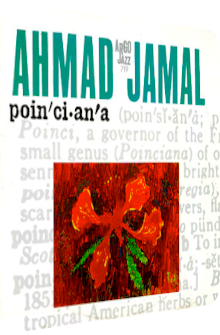
Ahmad Jamal
Poinciana
1958 / 1963
Jazz pianist Ahmad Jamal (born 1930 as Frederick Russell Jones) is close to the Exotica aficionado’s heart for one particular album only, the oft-cited truthful Exotica album Macanudo (1960) which sees the pianist surrounded by strings and tropical percussion layers while he plays exclusive compositions that are specifically written with this album in mind. It is likely that Jamal himself is not overly fond of the genre, or else this wouldn’t be the only genre-related entry in his discography… or is it? Well, that depends on the listener’s will to carefully accept Exotica’s adjacent genres and roots. Or to mention the real cotyledon, the deepest rhizome of all: Jazz. If one is an admirer of this versatile melting pot, Ahmad Jamal delivers. And with Poinciana, he caters to the Jazz lover and Exotica fanatic by including a few bits that occasionally cross the path to exoticism. Comprising of two live sessions as recorded in 1958, the album is released a whopping five years later in 1963 by Argo Records.
Cross-licensed to Cadet Records and Chess Records among many others, Poinciana features the talent of pianist Ahmad Jamal, bassist Israel Crosby and drummer Vernell Fournier in the Spotlite Club in Washington, D.C and the Pershing Lounge in Chicago, Illinois. No flamboyant instruments are on board, just the purest possible art form of the genre. But the material is dreamy alright, catering to fans of the Rene Paulo Group or Irving Fields Trio. With the exception of one gargantuan track, the material is highly accessible, beautifully melodious and aglow with an aural technicolor titration. This is warm Cool Jazz waiting to be inspected, so here we go.
What better way to start the album with Buddy Bernier’s and Nat Simon’s classic Poinciana? To me, it is one of the most beautiful songs ever written, and millions of people think alike, lest it would not be considered on so many Jazz albums, even contemporary ones. It is also one of the few songs that survives any alteration, be it string-infused akin to Les Baxter’s 1956 take or Percy Faith’s 1962 endeavor, served in the gestalt of a comical French mélange as in Karl Zéro’s Songs For Cabriolets (2000) or played in clear-cut Exotica style, for instance on Leis Of Jazz, Volume 2 (2014) by the Alika Lyman Group. Ahmad Jamal’s arrangement is less flamboyant, as it evokes the true spirit of Jazz with just one pianist, one drummer and one bassist.
Jamal surprisingly goes all-in on a swinging physiognomy: Vernell Fournier’s rhythmic oomph of the drums and coruscating luminosity of the cymbals allow much room for Israel Crosby’s double bass to protrude, but it is the dreamy and timeless melody on the piano which make all the difference. Obviously connected with its uplifting surroundings yet celestially floating and seemingly detached from the earthbound aura, Poinciana sees another facet of its beauty unfold.
From this point onwards, the trio presents two enchanted evenings at Chicago’s Pershing Lounge and start the set with Don Raye’s and Gene DePaul’s You Don’t Know What Love Is. Despite its pressing double bass punctilio and sweeping cymbals, the upbeat tune is yet again carried by warmhearted piano chords. Even the higher tone regions are not glacial at all but rather evoke the feeling of a clear night. Carefully set accents and attack rates amplify the oxymoron of dreamy energy further; the short rhythm shifts round this impression off. Arthur Schwartz’s and Leo Robin’s A Gal In Calico meanwhile invokes the picture of green meadows and sun-dappled hills as the prominently elastic double bass fuels the swinging spirits like a hydrazine. Plinking piano crystals and multitudinous tones in major translate to a childlike insouciance.
The following Ivy by Hoagy Carmichael sees the Ahmad Jamal Trio rev up the pointilism even more. Crosby’s slapped basslines are a bit more muffled and reside in higher regions, Fournier’s military march-like cymbals are less of a counterpoint than an array of gleeful wisps, and Jamal’s piano sparkles and jumps without losing neither momentum nor euphony. Irving Ashby’s Tater Pie rounds off side A. The tempo is revved up, the double bass is played in the archetypical billow-like aka jazzy way and the tone sequences on the piano are few and far between, cascade down, slide up and celebrate their own saltatory scheme.
Side B starts with the classic Autumn Leaves. The gold standard of Jacques Prévert, Johnny Mercer and Joseph Kosma is similar to Poinciana in that it is arranged and interpreted time and again, even losing its melancholy from time to time. The Ahmad Jamal Trio however takes it to new levels indeed. The tempo is rather fast which is all the more surprising when the runtime is considered: over seven and a half minutes are reserved for this piece, and so shapeshifting vignettes are a given: whether it is the sun-kissed Bop callisthenics in the opening phase, the aureate reflection at the apex or the tachycardia apotheosis with increasingly argentine drum currents, the presentation is eclectic but nonetheless open to scrutiny. Considering the reaction of the crowd, even the people in the audience don’t know that the song is indeed over after all these peaks, valleys and moulds.
Next on the agenda is Richard Rodgers’ and Lorenz Hart’s This Can’t Be Love, a much more golden and cohesive piece that exchanges convolution for translucency. While it is not exactly exotic, the cavalcade of good-natured tones speaks for itself. The evening is finished with Burton Lane’s and Edgar “Yip” Harburg’s Ole Devil Moon which is once more interpreted as a swinging piece. The many double bass-driven interstices and gyrations between melancholy and awe transfer the nocturnal aura skillfully and make this a great endpoint to an LP that is both languorous and energetic.
Poinciana (the composition) outshadows each and every of the other tunes that are presented here; Autumn Leaves comes in second. Naturally, such lists and explications are highly subjective, but I’m not even trying to deny that. Poinciana seamlessly works as a complete album, but these two songs evoke that kind of exoticism that is so luring. Despite the minimal – and ultimately classic – arrangements and the use of a drum kit, piano and double bass, the Ahmad Jamal Trio knows what to do and how to enthrall. Some of the slicker tunes such as This Can’t Be Love are usually not considered in Exotica circles, but look closer at the tracklist, and moony gems start to materialize that live up to that certain yearning.
In lieu of multitudinous instruments, the textures of the three principal instruments become regal: whether it is the benthic elasticity of Israel Crosby’s double bass, the helicoidal prolongation and staggering verve of Vernell Fournier’s rhythm or the prestidigitation of one Ahmad Jamal whose precision and technical superiority allow enough room for organic harmonies and vivacious pictures to appear before the inner eye, Poinciana works on both levels, be it the complex embroidery of jazzy interdependency or the warmhearted arabesques of beautiful melodies that transmogrify cityscapes into mirages of iridescent carefreenesss. Autumn Leaves is undoubtedly the best piece in terms of its sequencing, but all remaining gems are at least as immersive. The album is available on vinyl, CD, a download version and streamable. A great record even for Exotica fans… provided that they are Jazz lovers.
Exotica Review 432: Ahmad Jamal – Poinciana (1958). Originally published on May 16, 2015 at AmbientExotica.com.
